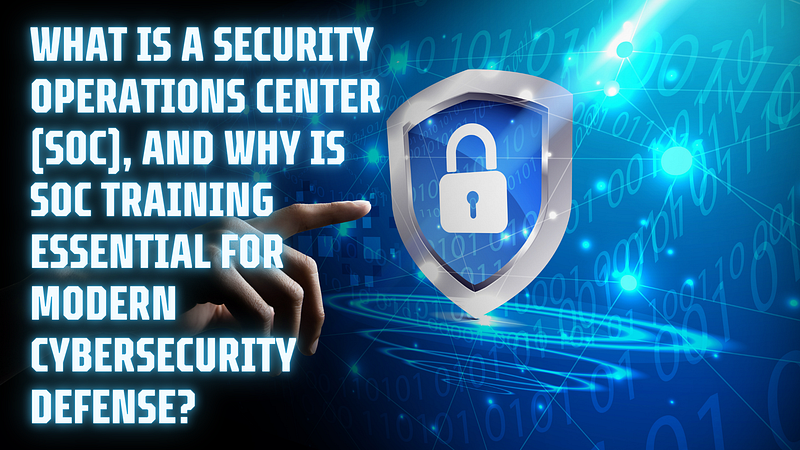What is a Security Operations Center (SOC), and Why is SOC Training Essential for Modern Cybersecurity Defense?

In an era where data is currency and cyber threats are more persistent than ever, organizations around the globe are prioritizing cybersecurity defense like never before. At the heart of this defense lies a powerful and strategic entity known as the Security Operations Center (SOC). Whether you’re an aspiring cybersecurity professional or an enterprise leader, understanding the role of a SOC — and the importance of SOC training — is crucial to building a secure digital future.
What is a Security Operations Center (SOC)?
A Security Operations Center (SOC) is a centralized unit within an organization that deals with security issues on an organizational and technical level. It consists of a dedicated team of SOC analysts, engineers, and cybersecurity professionals who work together to monitor, detect, investigate, and respond to cyber threats around the clock.
The SOC is essentially the command center for cybersecurity operations. Using a combination of tools like SIEM (Security Information and Event Management), threat intelligence feeds, and automated alerting systems, the SOC team constantly reviews logs, monitors network activity, and responds to potential security incidents in real-time.
Key Functions of a SOC
A fully operational SOC is responsible for the following:
- 24/7 Threat Monitoring: SOC teams use real-time data feeds to monitor all network traffic, server activity, and endpoint behavior to identify potential threats.
- Incident Detection and Response: SOC analysts are the first responders when alerts are triggered. They investigate and contain threats before they escalate.
- Vulnerability Management: Regular scanning and patch management help close potential loopholes before attackers can exploit them.
- Log Management and Analysis: A SOC collects and analyzes logs from different systems to establish baseline activity and detect anomalies.
- Compliance and Reporting: SOCs ensure regulatory compliance by tracking security events and generating required reports.
Who Works in a SOC?
A SOC isn’t just about tools — it’s about people. It typically includes:
- Tier 1 SOC Analysts: Monitor alerts, perform triage, and escalate critical incidents.
- Tier 2 Analysts: Investigate escalated threats, conduct deeper analysis, and initiate containment.
- Tier 3 or Threat Hunters: Proactively look for threats that bypass traditional defenses.
- SOC Managers: Oversee operations, workflows, and team performance.
Each of these roles plays a vital part in maintaining an effective cybersecurity posture — and all require targeted, hands-on training.
Why SOC Training Is Essential Today
1. Evolving Cyber Threat Landscape
Cyber threats are growing in complexity and volume. From ransomware attacks to supply chain compromises, the techniques used by hackers are constantly evolving. SOC analysts need to be well-trained in understanding these patterns, identifying zero-day vulnerabilities, and responding swiftly to attacks.
2. Real-Time Defense Requires Skilled Response
A SOC analyst must think fast. They deal with real-time incidents that can damage brand reputation or result in major financial loss. Without SOC training, it is impossible to respond efficiently or accurately during time-sensitive cyber events.
3. SOC Tools Are Specialized
Understanding how to operate a SIEM tool, interpret log data, and manage endpoint detection systems is not something you learn overnight. SOC training covers everything from log analysis and network traffic inspection to automation using SOAR (Security Orchestration, Automation, and Response) platforms.
4. High Demand for Skilled SOC Professionals
Due to the increasing reliance on digital infrastructure, there’s a global shortage of skilled cybersecurity talent. Certified and trained SOC analysts are in high demand across industries such as banking, healthcare, government, telecom, and e-commerce.
What Does SOC Training Include?
Comprehensive SOC training prepares individuals to function effectively in real-world security environments. A high-quality SOC course will typically cover:
- Introduction to Security Operations
- Understanding SIEM (e.g., Splunk, QRadar, ELK)
- Log Analysis and Threat Detection
- Incident Response Frameworks
- Working with Firewalls, IDS/IPS, and Endpoint Protection
- Cyber Kill Chain and MITRE ATT&CK Framework
- Hands-On Labs and Simulated Attacks
- Case Studies and Role-Based Scenarios
Some programs also include SOC certification, making learners job-ready for roles like SOC Analyst Level 1 or 2, Security Monitoring Specialist, or Incident Responder.
Why Choose Overture Rede for SOC Training?
Overture Rede is a trusted leader in cybersecurity education and workforce readiness. With a mission to bridge the skills gap in emerging tech roles, Overture Rede’s SOC training programs are designed to align with industry needs and global standards.
What We Offer:
- Instructor-Led Live Sessions
- Hands-On Labs and Threat Simulations
- SOC Tools Training (Splunk, ELK, IBM QRadar, etc.)
- Mock Interviews & Career Coaching
- Flexible Online Learning Format
- Placement Assistance with Hiring Partners
Whether you’re a student, IT support engineer, or tech enthusiast, OvertureRede SOC training will give you the skills and confidence to succeed in the fast-growing cybersecurity domain.
Getting Started
🔐 Want to join the front line of cyber defense?
📞 Call: +91 95822 24661
📧 Email: crm@overturerede.com
🔗 Apply Now: https://lnkd.in/gEyn-Mfe
Final Thoughts
A Security Operations Center is more than a room with screens — it’s a dynamic, high-pressure, and essential part of modern cybersecurity strategy. To succeed in this environment, aspiring professionals need more than theory; they need hands-on SOC training that mirrors real-world conditions.
As cyber threats continue to grow, trained SOC analysts are becoming one of the most critical assets an organization can have. Start your journey with Overture Rede and become a cyber defender the industry needs.
Comments
Post a Comment